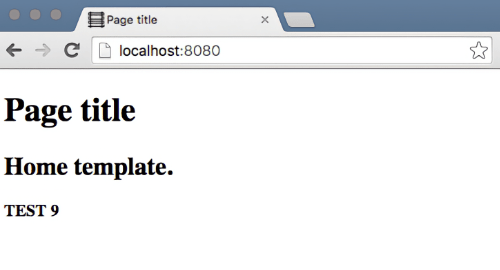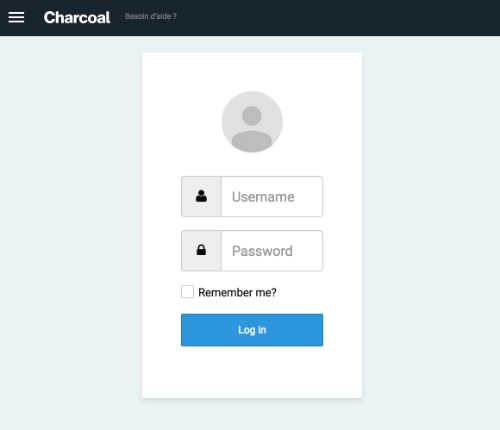charcoal / boilerplate
A Charcoal Project Boilerplate
Installs: 82
Dependents: 0
Suggesters: 0
Security: 0
Stars: 3
Watchers: 4
Forks: 0
Open Issues: 0
Type:project
pkg:composer/charcoal/boilerplate
Requires
- php: ^7.4 || ^8.0
- charcoal/charcoal: ^5.0
- mustache/mustache: ^2.14
- twig/twig: ^3.4
Requires (Dev)
- phpstan/phpstan: ^1.10
- phpunit/phpunit: ^9.5
- seld/jsonlint: ^1.10
- squizlabs/php_codesniffer: ^3.8
- vimeo/psalm: ^5.18
This package is auto-updated.
Last update: 2026-01-30 19:48:53 UTC
README
A skeleton for creating Web sites with Charcoal.
See below for an overview of this skeleton's structure and objectives.
Installation
This skeleton is available on Packagist and can be installed using Composer:
composer create-project charcoal/boilerplate example-project
After the skeleton is installed, point the document root of your Web server
to the example-project/www directory.
By default, the skeleton includes an Apache .htaccess file.
See below for examples on configuring your Web server.
From the command line, PHP provides a built-in Web server for quickly serving your project:
cd www
php -S localhost:8080
Visit http://localhost:8080 in your browser to see the following:
Update
The skeleton does not provide any process for automated upgrades. You will have to port any updates manually.
This is because the skeleton is a starting point for your project and its various files are mainly present for demonstration and would otherwise be removed or modified for your purposes.
Application Configuration
Create a copy of the config/config.sample.json
file and name it config/config.local.json. This is your environment specific
configuration file and it should be excluded from your project's source control
repository. Edit this file to configure services such as the database,
third-party services, logs, and caches.
Any other options relevant to your project should be changed in all other
files in the config directory.
Database Configuration
If your project does not require any database storage, use a database in-memory
such as SQLite by adding the following to the config/config.local.json file:
{
"databases": {
"default": {
"type": "sqlite",
"database": ":memory:"
}
},
"default_database": "default"
}
If your project uses MySQL, create an empty database and ensure a SQL user
has the proper permissions for this database. Then add the following to the
config/config.local.json file:
{
"databases": {
"default": {
"type": "mysql",
"hostname": "127.0.0.1",
"database": "foobar",
"username": "foo_bar",
"password": "l337"
}
},
"default_database": "default"
}
Project Name
By default, the skeleton uses "Acme" as a dummy name. There are a few occurrences throughout the repository that should be changed to reflect your project:
config/admin.json: Seeadmin.title.config/config.json: Seeproject_nameandcache.prefix.
You should also change the details of the Composer dependency manifest:
composer.json: Seename.
Administration Dashboard
A quick-and-dirty command line script is provided to install the assets for the administration area:
./build/scripts/install-charcoal-admin.sh
Afterwards, visit http://localhost:8080/admin/login in your browser to see
the following:
The administration area can be customized from the
config/admin.json file.
Install Locomotive Boilerplate
Optionally, another quick-and-dirty script is provided to install the Locomotive's front-end development tools:
./build/scripts/install-locomotive-boilerplate.sh
For more information, visit Locomotive's Boilerplate repository.
Server Requirements
Server Configuration
Apache Configuration
Use the following configuration as a starting point for configuring
the Apache HTTP server. Note that this
should be used instead of the skeleton's .htaccess file.
Note that you should replace
path/to/example-project/wwwwith the actual path forexample-project/www.
Example: Apache configuration
# Set document root to be "example-project/www" DocumentRoot "path/to/example-project/www" <Directory "path/to/example-project/www"> <IfModule mod_rewrite.c> RewriteEngine on # If a directory or a file does not exist, # forward the request to the application controller RewriteCond %{REQUEST_FILENAME} !-d RewriteCond %{REQUEST_FILENAME} !-f RewriteRule ^ index.php </IfModule> </Directory>
Nginx Configuration
Use the following configuration as a starting point for configuring the Nginx HTTP server.
Note that you should replace
path/to/example-project/wwwwith the actual path forexample-project/www.
Example: Nginx configuration
server { listen 80; listen [::]:80; server_name example-project.test; root /path/to/example-project/www; access_log /path/to/example-project/logs/access.log; error_log /path/to/example-project/logs/error.log; index index.php; charset utf-8; location / { # Redirect everything that isn't a real file to index.php try_files $uri $uri/ /index.php$is_args$args; } location = /favicon.ico { access_log off; log_not_found off; } location = /robots.txt { access_log off; log_not_found off; } error_page 404 /index.php; location ~ \.php$ { fastcgi_pass unix:/var/run/php/php8.0-fpm.sock; fastcgi_param SCRIPT_FILENAME $realpath_root$fastcgi_script_name; include fastcgi_params; } location ~* /\. { deny all; } }
Development
Linting
By default, the skeleton is developed with a number of coding style and static code analysis tools:
- EditorConfig — Maintain consistent coding styles between different editors.
- JSON Lint — JSON coding style linter.
- PHP Syntax Check — PHP syntax checker from the command line.
- PHP_CodeSniffer (PHPCS) — PHP coding style linter.
- PHPStan — Static PHP code analyser.
- Psalm — Static PHP code analyser.
PHPStan and Psalm are used together to take advantage of each one's specialties.
Linting can be executing by running one of the following commands:
# Run JSON Lint, PHP Lint, PHPCS, PHPStan, and Psalm composer lint # Run only JSON Lint composer lint:json ./vendor/bin/jsonlint config/*.json # Run only PHP syntax check composer lint:php php -l src/*.php # Run only PHPCS composer lint:phpcs ./vendor/bin/phpcs -ps --colors src/ # Run only PHPStan composer lint:phpstan ./vendor/bin/phpstan analyse # Run only Psalm composer lint:psalm ./vendor/bin/psalm
Most of these tools can be configured from the following files:
- EditorConfig — The
.editorconfigfile. - PHP_CodeSniffer — The
phpcs.xml.distfile or aphpcs.xmlfile. - PHPStan — The
phpstan.neon.distfile or a localphpstan.neonfile. - Psalm — The
psalm.xml.distfile or a localpsalm.xmlfile.
Testing
By default, PHP tests are located in the tests directory and developed
with the PHPUnit framework.
Tests can be executing by running one of the following commands:
composer test
composer test:phpunit
./vendor/bin/phpunit
PHPUnit can be configured from the phpunit.xml.dist
or a local phpunit.xml file.
Optimization
Locked Dependencies
Your project's dependencies can be installed considerably faster when you
include the composer.lock file in your project's source control repository.
Composer automatically generates and keeps this file up to date.
Autoloader Optimization
When deploying to production, ensure that you are optimizing Composer's class autoloader map so Composer can rapidly find the corresponding file for a given PHP class:
composer install --optimize-autoloader --no-dev
Contributing
We appreciate any contribution to the skeleton and Charcoal, whether it's a bug, typo, suggestions, or improvements.
Overview
Although it is ready to use, this skeleton is still incomplete.
It does not yet showcase all of the features of the Charcoal framework and therefore requires a lot of manual tinkering for options.
The following is a short "mission statement" of what is expected to be accomplished with this skeleton:
- A fully automated setup process.
- Optional installation of Locomotive Boilerplate for rapid front-end integration.
- Support for unilingual and multilingual applications.
- Default data provided in English and French.
- Easy internationalization (i18n) and localization (l10n).
- Support for Mustache and Twig templating.
- Home page, with a few options and widgets (like carousel) or similar.
- News list / news details, with attachment support.
- Calendar (event list) with ajax options / event details, with attachment support.
- Blog / article details, with attachment support and options to enable comments, and ajax actions
- Contact, with a contact form that saves to a database and send a confirmation email depending to category options, with ajax actions.
- Map, with locations by categories.
- A working administration dashboard.
- User management.
- With a default configuration that allows to manage CMS objects (sections, news, events, blogs, locations, etc.)
- Permission system working and enabled.
- Notification system working and enabled.
- Revisioning system working and enabled.
- Media library working and enabled.
- Built-in help (doc) system working and enabled.
- Metadata 100% fully working on every pages and for every objects.
- Use objects' metadata information, which all are editable in
charcoal-admin.
- Use objects' metadata information, which all are editable in
- Provide an optimized set of SEO features.
- Search enabled
- Results returned for all types of cms objects (sections, news, events, blogs, locations, etc.)
- Used keywords, which all are editable in
charcoal-admin. - Also search in attachments.
- Auto-complete enabled and working.
- 100% tested with PHPUnit.
🚂


